

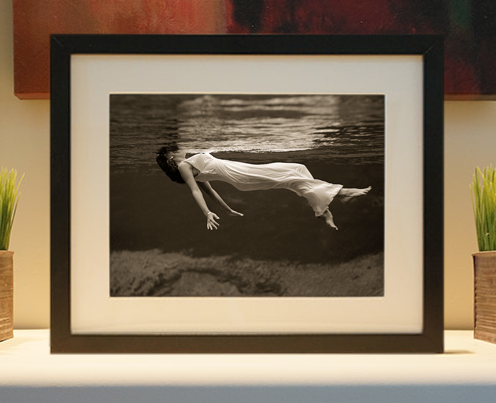
Framed or unframed, desk size to sofa size, printed by us in Arizona and Alabama since 2007. Explore now.
Shorpy is funded by you. Patreon contributors get an ad-free experience.
Learn more.

- Freeze Frame
- Texas Flyer wanted
- Just a Year Too Soon
- WWII -- Replacing men with women at the railroad crossing.
- Yes, Icing
- You kids drive me nuts!
- NOT An Easy Job
- I wonder
- Just add window boxes
- Icing Platform?
- Indiana Harbor Belt abides
- Freezing haze
- Corrections (for those who care)
- C&NW at Nelson
- Fallen Flags
- A dangerous job made worse
- Water Stop
- Passenger trains have right of way over freights?
- Coal
- Never ceases to amaze me.
- Still chuggin' (in model form)
- Great shot
- Westerly Breeze
- For the men, a trapeze
- Tickled
- Sense of loneliness ...
- 2 cents
- Charm City
- What an Outrage
- Brighton Park
Print Emporium
Giant Food: 1942
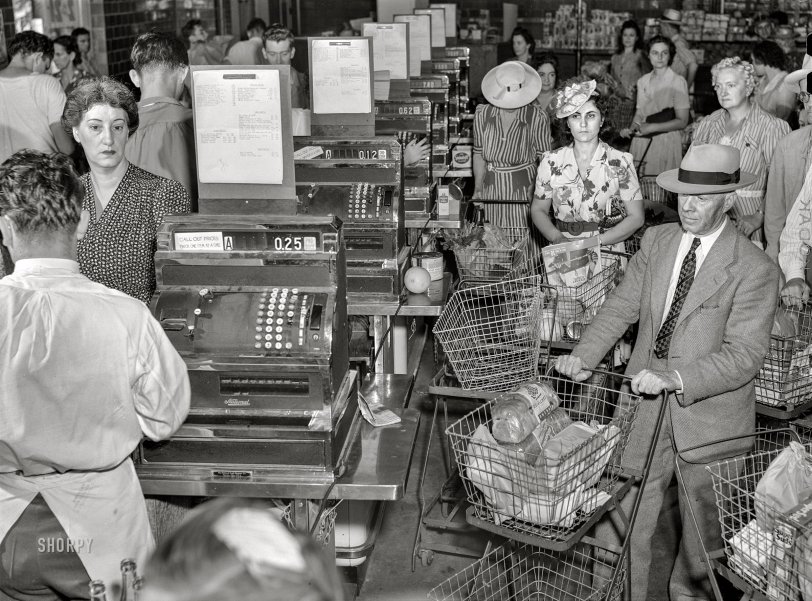
June-July 1942. Washington, D.C. "Cashiers checking out customer purchases with Ration Book No. 1 at the Giant Food shopping center on Wisconsin Avenue. Giant Food Store is a self-service market chain handling all types and many varieties of food and household appliances." Acetate negative by Marjory Collins for the Farm Security Administration. View full size.
Bewildered Shopping
The dazed look of the shoppers hints at this not so pleasant experience.
Supermarkets realized at some point after this era, that larger trolleys meant more sales. Those register prices could easily translate from cents to dollars today.
Someone needed to do a time and motion study to streamline the queue process.
Self-Check Lives!
"Today 'self-checkout' stations are a familiar sight, though Wegmans discontinued them in 2022 due to pilfering."
I self-checked this afternoon at the Wegmans in Frederick, Msryland. It was about a hundred bucks' worth of groceries.
Giant Foods
You don't have to worry about Giant charging you a stealthy extra charge. Their basic prices are exorbitant. Probably 10-20% higher than their competitors in Northern Virginia.
80 years later
… and cashiers in the US still aren’t allowed to sit down.
Speaking of lines
The traffic pattern in this photo looks like it was designed to make the jams worse.
Shoppers appear to queue up from the right, diagonally, to the row of registers.
Then, once totaled and paid, the only way out is, "excuse me, excuse me, excuse me", etc.
And the lady on the left with the eagle eye on the clerk -- is she in a separate feed, entering from that side? To the same register??
Is everybody happy?
Shopping is supposed to be fun. They look like they're at a funeral!
Oh, that look
She's listening. She's watching. She may even be tallying the total in her head, something I recently witnessed at a checkout register. No error will slip past her. The checkout clerk won't be calling out one price while ringing up another. And I appreciate her effort. She keeps the store honest for people like me, who should pay more attention.
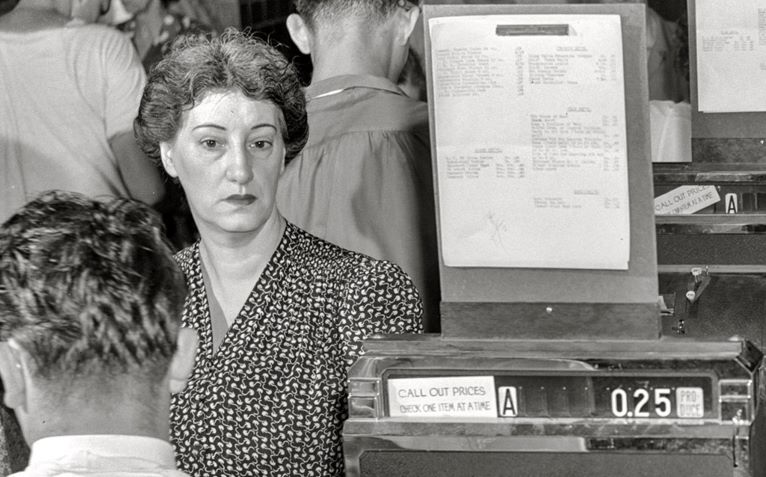
Zebras Don't Change Their Stripes
... but a dress can when it is cleverly designed. The striped dress, worn by the woman on the right with the down-turned hat, appears to have contrasts applied to it, but the solid is really wonderfully and precisely done tucks. The effect is not simply for decoration, but for construction and fit. The tucks contour the fabric to fit the narrow upper part of the bodice, and end at a point that expands to fit the bust. The same technique is used to draw in the waist, and then flair for the curve of the hips.
One of the trickiest things I ever sewed was an Albert Nipon-designed dress of silk crepe de chine that featured cross-tucking. Talk about putting the ART in domestic arts - intricate tucks create something with a sense of wearable architecture. Anyone who is similarly impressed by the striped-n-tucked Shorpy dress can learn more here.
Thank you DeeGee
Very nice. Alex Le Gerda of Topton, PA.
They still need more clerks
The lines aren't quite as long at Giant stores today, but they still often need more people staffing the registers, even with barcode scanners and some self-service checkout stations.
Antonyms
The stolid expression of the woman on the left is either determined or resigned. We've all been there ... heck, I WAS there yesterday during the pre-blizzard, Christmas-compounded panic in our local grocery stores.
Twilight zone
The woman on the left of cashier looks like an alien.
If only
I wish they would follow the CALL OUT PRICES and CHECK ONE ITEM AT A TIME rules today. Bar codes have made it nearly impossible to keep track at checkouts, and printed receipts (a least around here) feature oddball abbreviations so the customer may have no idea what's listed. That is, if they even give a receipt.
An odd building
In my high school days the place housed a hardware store that I frequented. I believe it's a grocery store again, though I haven't been by there in a while. It's a one-story building with a ramp alongside so that its parking lot is on the roof -- a configuration I've never seen before.
The $1200 Man
or Woman.
Ladies, if you didn't like the opportunities at People's - which you might remember described its wages as "excellent" (but didn't define them) - just keep right on looking
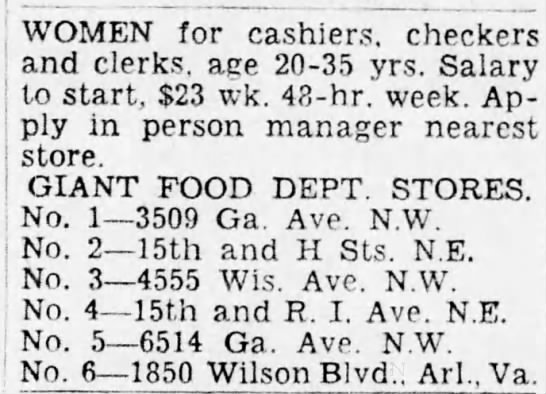
(Yet another listing to explicitly call for females ... the War is beginning to change things)
[That had nothing to do with the war. - Dave]
Nothing ?? Well I'll settle for "not entirely": clerking had traditionally been a male occupation - as it seems to be in the picture - but admittedly it's hard to separate "war related" from the slow evolution into gender neutrality.
Self-service?
"Self-service" simply means that the customer is able to take significant actions without the aid of store personnel. Clearly, in 1942 and for long after, that stopped at the check-out. Today "self-checkout" stations are a familiar sight, though Wegmans discontinued them in 2022 due to pilfering.
[update: thirteen says self-checkout is available at Wegmans. Aha: reading more closely, my source (NY Times 9-18-22) says that what was halted was its "app in which customers scanned their groceries as they shopped." This is interesting, because there's a distinction between self-checkout (SCO) and assisted checkout (ACO), which is where an employee is positioned at the scanners. You might call that panoptic self-checkout.]
Just who invented the self-service grocery is open to debate, with both Alpha Beta and Piggly Wiggly laying claim.
The 1942 caption suggests that many Americans were not familiar with this kind of store. It became familiar from scenes in the 1944 movie "Double Indemnity", shot at Jerry's on Melrose Avenue in Los Angeles. Because the movie was set in 1938 before World War II rationing, the shelves were fully stocked--but armed guards were posted to prevent people from carrying off the riches on display.

Thank you for your service
The lady in the floral dress with the cocked hat has the July 13, 1942 edition of Life magazine in her cart; the cover story is all about Corporal Alexander Le Gerda of the 853rd Ordinance Ordnance Company. A little more about him.
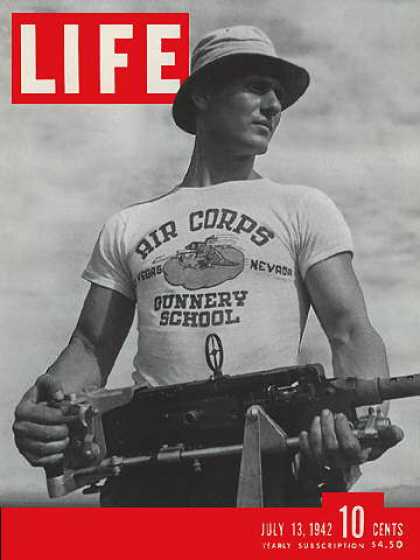





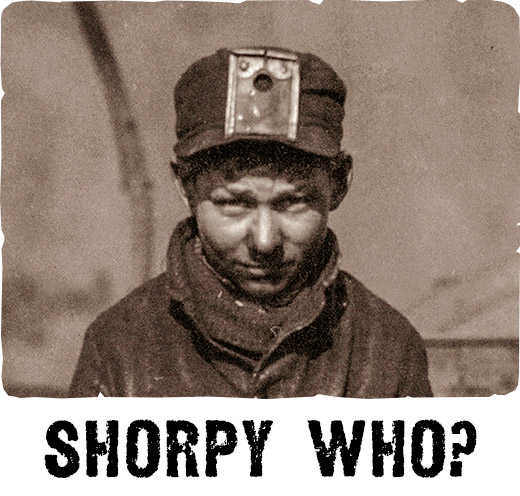
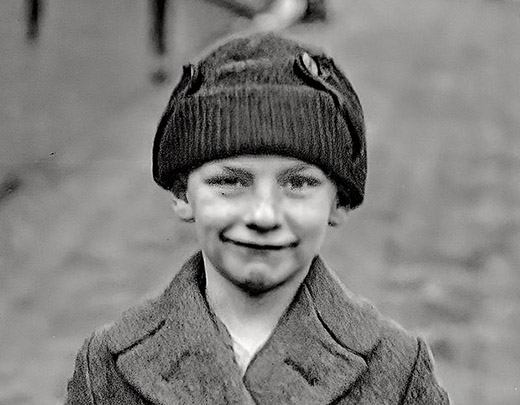
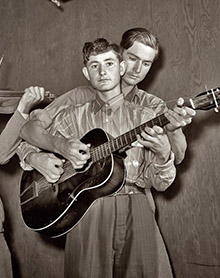
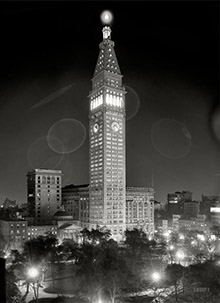
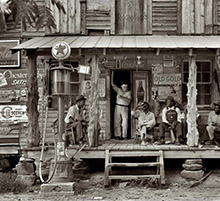
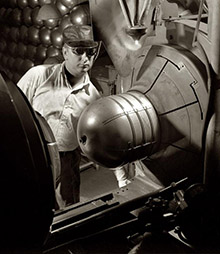
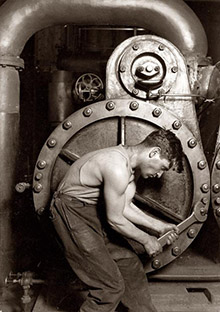

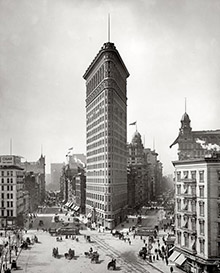



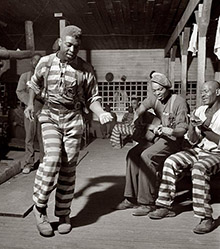

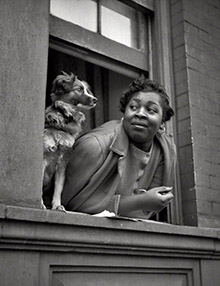

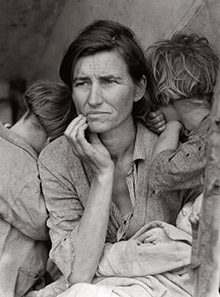

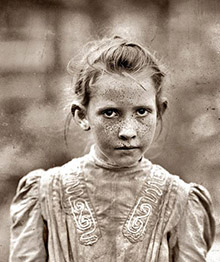
On Shorpy:
Today’s Top 5